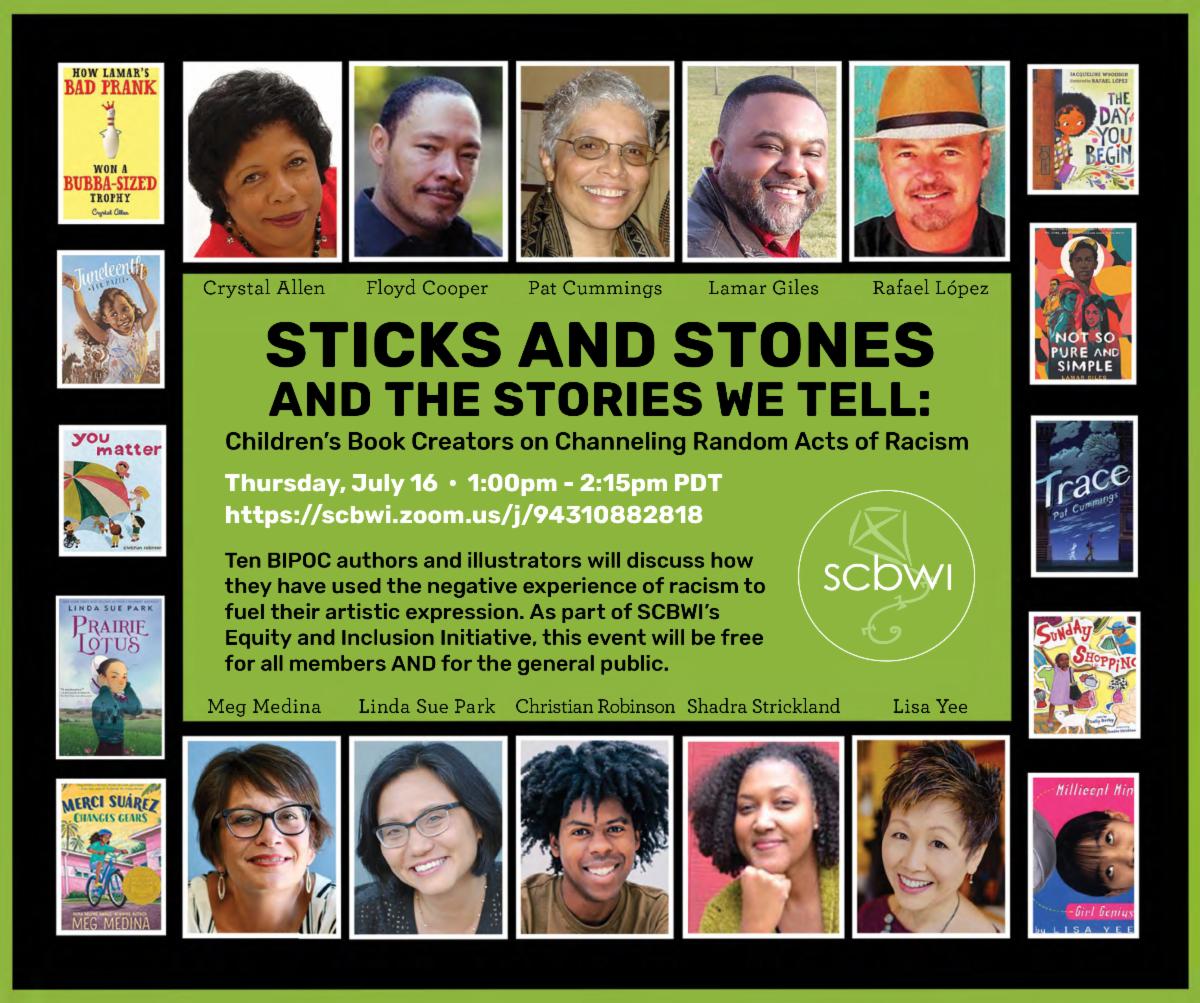
The young man was bumping like a pinball through the crowded sidewalk on Greenwood Ave—the “Black Wall Street” of Tulsa, OK. Suddenly he was hit by two bullets. One hit his shoulder; one traveled around his skull and landed near his nose, a few centimeters from his brain.
To operate presented terrible odds–50/50 odds of survival and even if he lived, he might end up insane at best. He decided to leave the bullet there and lived the rest of his life with it. The man was the father of children’s illustrator Floyd Cooper, shot by a white man in the long-hidden 1921 race massacre in Tulsa.
Cooper told this story as part of a Society of Children’s Book Writers and Illustrators panel featuring ten best-selling, award-winning (from Newberys to Caldecotts) children’s writers and illustrators of color. In five-minute segments, each creators shared their experiences with racism and racist assumptions, and how that informs their work.
It wasn’t a lecture; it was a sharing of coming to the creative life from many different places.
Author Crystal Allen began her career in middle-grades as any serious writer would with research into the kind of books she wanted to write–African American middle-grade books. But she couldn’t find any on the shelves of her local bookstore. When she asked about it, she was told she wouldn’t find anything on those shelves. Instead she followed the store clerk for “what felt like six days” to the African American section.
In a small dusty room, the clerk pointed to a spindle with a smattering of middle-grade books. The clerk left and Allen says she followed right behind. Later, she was told by an instructor that the reason she couldn’t find any African American middle grades is that publishers wouldn’t publish them. They aren’t marketable she was told.
“Hopefully, you brought something else you can work on,” the instructor said. Allen left that workshop, too.
She wondered if she’d heard the voice of truth.
As a college student, illustrator Rafael Lopez lived on the Mexican side of the U.S. border, but traveled to the U.S. for his classes. He would get up at 3:30 to 4:00 every morning, in order to cross the busy border in time to get to his 8:30 class. Usually he’d arrive 5 to 10 minutes late.
One morning as he entered the classroom, his professor announced, “There he is. Mr. L-o-p-e-z.” The prof said his last name slowly. “Late as usual.”
“That really stung,” Lopez said. “He didn’t know my story, but he judged.”
In the beginning of what he hoped would be a career in advertising, he was offered a job that would have meant creating a demeaning stereotype of Latino “peasants”. The man who wanted to hire him thought his idea for the ad was wonderfully clever and funny. Desperate for money, Lopez considered it, but ultimately turned the job down.
Lisa Yee, third-generation Chinese, was accustomed to living in a very diverse community in West Hollywood. But driving across country to a job a Florida, she found herself the only Asian American around. Most people were very nice, she said, complimenting her on her English, especially her accent.
Yee was more amused, than offended. But one day as she and a friend wended their way along winding roads through small towns, she was intrigued to see that there was some sort of festival or parade happening in the town ahead of them. How interesting it looked. And everyone was dressed in white, a kind of cool costume parade! Then suddenly she realized she as looking at a Klan rally. Still, intrigued, she urged her friend to drive closer.
It was like a movie as she looked out her car window at the crowd. Then suddenly people were turning to look at her and the terror kicked in. She ducked down and told her friend “Get out of here!” It didn’t feel like entertainment any more.
These are just a few of the stories the creators shared. Each had different experiences of being “other.” And yet each also described how they found a haven–a welcoming place, a valid space–in the world of children’s books. And each told how such experiences drive them to make sure their cultures and characters and stories are out in the world.
So maybe no more thin spindles in dusty rooms for diverse books?
You can watch a video of the full panel here.
And check out these other panelists.
Panel organizer, Pat Cummings

